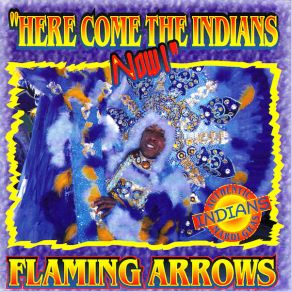Here Come the Indians Now
Download links and information about Here Come the Indians Now by Flaming Arrows. This album was released in 1997 and it belongs to World Music, Songwriter/Lyricist genres. It contains 11 tracks with total duration of 48:12 minutes.

|
|
|---|---|
| Artist: | Flaming Arrows |
| Release date: | 1997 |
| Genre: | World Music, Songwriter/Lyricist |
| Tracks: | 11 |
| Duration: | 48:12 |
| Buy it NOW at: | |
| Buy on iTunes $9.99 | |
| Buy on Amazon $8.99 | |
Tracks
[Edit]| No. | Title | Length |
|---|---|---|
| 1. | Sew, Sew | 4:21 |
| 2. | Corey Died On the Battlefield | 4:41 |
| 3. | Here Come the Indians Now | 3:15 |
| 4. | Shoo Fly | 5:12 |
| 5. | Shallow Water | 4:07 |
| 6. | Hell Out the Way | 4:57 |
| 7. | Li'L Liza Jane | 4:42 |
| 8. | My Gang Don't Bow Down | 3:38 |
| 9. | Let'S Go Get 'Em | 3:19 |
| 10. | Indians Here We Come | 5:25 |
| 11. | Redemption Song | 4:35 |
Details
[Edit]One of the most unique sights in New Orleans is that of the tribes of Mardi Gras Indians who parade through the streets of the city from Mardi Gras morning through St. Joseph's Day, March 19. The traditions, costumes, and music of the Mardi Gras Indians have become the subject of worldwide interest and acclaim. One of the tribes active in the city is Flaming Arrows. You can see them out on the streets on Mardi Gras day, vying with other tribes, such as Wild Magnolias and Golden Eagles, for who is the prettiest. That judgment is rendered by the crowds who gather to admire the fancy bead and feather work in the Indian costumes and in the dance competitions that accompany Indian music. This recording chronicles just such a day in the rich heritage of Flaming Arrows. Bandmembers include Milton Batiste on trumpet, Joe Saulsbury Jr. on alto and tenor saxophone and flute, Harold Scott on bass, Harry Sterling on guitar, Eneal Wimberly on drums, Kenneth "Afro" Williams on conga and vocals, and Kevin Goodman on vocals. The album starts with a song called "Sew, Sew," relating the inside story of the sewing sessions that go on all year to produce the fabulous costumes which tribe members produce new each year. Included are traditional Mardi Gras Indian songs, such as "L'il Liza Jane" and "Shoo Fly," which are typical of the call-and-response style used on the streets. "Hell out the Way" and "My Gang Don't Bow Down" exemplify the proud and bold nature of the gangs who meet, preen, and dance each other down. In the old days, there were sometimes fights to the death. The title cut and "Indians Here We Come" speak to the pride taken in this historic tradition, as the Big Chief, Spy Boy, Flag Boy, and gang members make their way through the neighborhoods. Always there is the sound of the drums and the peculiar backbeat of the city, accompanied by some of the best brass band music around. This record ends with an unusual but appropriate selection, Bob Marley's "Redemption Song," a song of freedom.